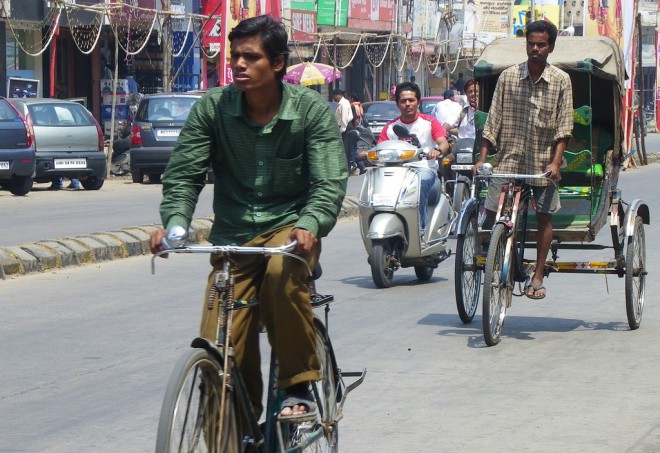
Manfred Neun: For Cyclists in India, There’s More Than Cycling Bans
Despite being a country with a high share of cycling, India struggles with growing traffic problems as many emerging countries do. But there are encouraging signs that India is turning to cycling as a solution. We report on ECF president Manfred Neun's tour of India.
India has just made headlines in the cycling world – not the best ones, unfortunately. Calcutta, one of India’s largest cities, has banned cycling from major streets this summer. The decision has led to outrage by many cycling advocates and demonstrations by thousands of inhabitants demanding the right to continue using their preferred mode of transport.
Yet, India is still one of the countries in the world where cycling is strongest. With a modal share of 9 to 18 percent in cities, Indians cycle much more than most Europeans, not to mention the United States. Nitish Kumar, chief minister of the Indian state of Bihar, recently encouraged people to cycle to work.
India is not just a country where many people cycle, but also one where the challenges to sustainable mobility are well understood. SuritaNarain may count as an example. “She is a well-known Indian environmentalist and political activist”, says ECF president Manfred Neun, who met her on his recent trip to India. Narain will shortly publish her book “The City: for the People, not for Cars”. Manfred Neun says cycling will play a significant role in the book, a sign that Calcutta does not represent the approach to cycling in India as a whole.
“Of course, the decision by Calcutta city council to ban bikes on major streets is and remains not only stupid, but scandalous,” says Manfred Neun. “I have met an official from Calcutta while I was in India, but as the decision has been formally taken, it is very difficult to change minds now.”
Yet when he attended a workshop with more than 200 participants on sustainable transport development, Manfred felt it was very clear that the majority of participants were very well informed about the need to tackle India’s growing traffic problems.
Looking beyond Calcutta
You just have to take a trip to Hyderabad in the south-eastern state of Andhra Pradesh, for example. Hyderabad is one of the centers of India’s IT industry. And it has many cyclists – mainly young professionals that work for one of the numerous IT firms in the city’s “Cyberabad” district.
Manfred Neun has a story to tell from his recent visit to Hyderabad and Cyberabad, when he was offered an invitation to a cycling event. “I thought I was being invited to participate in a Sunday-morning cycle race”, he says. “I was completely surprised when I realized that it actually was the launch of a ‘cycle to work’ campaign in order to promote Hyderabad’s modern, 60km network of cycle routes, integrated with a well-working and modern public transport system.”
The event included the opening of a new bike station that allows for the storage of 300 bikes, as well as the launch of a professional lifestyle campaign targeting all ages. And political interest is real as well. “The opening of the bike station and the cycle to work campaign was celebrated by an impressive number of high officials and headed by the governor of the state of Andhra Pradesh, E. S. L. Narasimhan,” Manfred Neun recalls.
India, as it becomes clear, has more to offer to its cyclists than cycling bans. “We hope that Calcutta’s city officials will find a way to re-integrate cyclists into their city, and to win back the benefits of cycling for all,” says Manfred Neun.
To know how to do so, after all, they just have to take a look around in their own country.
About the Author
Karsten Marhold works as Communications Assistant at the European Cyclists’ Federation. He has a masters degree in European history and cultures and is a researcher in European Integration in Brussels. His interests focus on cycling as a sustainable form of mobility and the corresponding EU policies.
- Log in to post comments
Contact the author
Recent news!
Upcoming events
Contact Us
Avenue des Arts, 7-8
Postal address: Rue de la Charité, 22
1210 Brussels, Belgium











